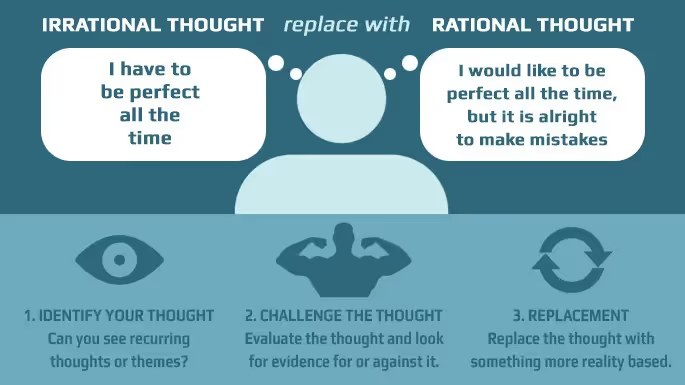Our minds are very tricky things.We become wrapped up in our thoughts throughout the day, every day of every week of our lives.It's easy to become tricked...

Our minds are very tricky things.
We become wrapped up in our thoughts throughout the day, every day of every week of our lives.
It's easy to become tricked into believing that our thoughts are both valid and true.
Even more so, to become tricked into believing that they're the only thoughts we can have.
In reality, however, our thoughts are as fleeting and often as insubstantial as clouds passing by overhead.
They come, we get emotional, they pass, and we relax.
Our thoughts take us on this roller-coaster all day every day.
But what most people don't realize is that they have a say in the way they think.
Not only that but they don't actually have to think about anything that troubles them at all.
The mind does a great job of fooling us into believing that things make us angry, upset, hurt, anxious, etc. but we do that all on our own.
We convince ourselves that it's the things in the world that trouble us, but what if I told you it's you who troubles you?
To quote one of the greatest thinkers of all time, Epictetus, "It's not things that trouble us, but our judgments about things."
Do a quick Google search for "quotes about perception" and see just how many great thinkers, leaders, and religious teachers share this same perspective, and for good reason.
This notion is especially true when it comes to anxiety.
Anxiety is the greatest trick the mind has ever played on the human race.
We can think of anxiety as the "trickster" character from movies and myths (think of Loki from Marvel, Bugs Bunny, or the Cheshire Cat from Alice in Wonderland).
Anxiety plays annoying games without thoughts and emotions to heighten our self-awareness, humble us and ultimately lead us to overcome great odds (unless you're Elmer Fudd, in which case that wascally wabbit will always get away).
The point is, anxiety makes us feel like we are under serious threat and it's scary.
But, once you sit and unpack what's actually making you nervous you realize (logically) that there's no real threat at all.
And, once you face it, you learn that you are braver than you thought; that you can triumph over fear, and that your thoughts about something can be, and are often, wrong.
In this way, you can use your anxiety to find opportunities to be brave, to grow, and in the process prove over and over that your thoughts and emotions are merely a trailhead, not a trap.
How can you start making this change in your perception?
Easy, begin by making a note (on your phone, journal, post-it notes, etc.) every time you feel anxious.
Write down what it is about the situation that evoked the anxiety, BE SPECIFIC; nail it down as much as you can.
It sometimes helps to ask yourself, "What part of me was being threatened by this situation?"
Then ask yourself, "Is that really under threat, what would actually result from that situation if it happened- worst case, best case, and most realistically?"
The above reflective exercise is a powerful tool that will help unpack vague emotions and thoughts so you can become clear about your specific triggers and the underlying emotion that comes with them.
It also teaches you how to challenge your initial thoughts and create a spectrum of possible outcomes as opposed to assuming the absolute worst every time.
Challenging your initial reactions and reflecting on those reactions are essential to overcoming anxiety.
But, what can you do in real-time to help that intense feeling dissipate?
BREATHE!
This is not a joke; when you feel anxiety building, take a minute (literally 60 seconds) and focus on your breathing.
Both box-breathing (inhale for a count of 4, hold for 4, exhale for 4, repeat) and physiological sighs (two sharp inhale through the nose, long controlled exhales through the mouth, repeat) is extremely effective in reducing anxiety in real-time and only take a minute to do.
Take a minute right now to try it out, the more you practice breathing while you're calm the more likely you'll do it when you're anxious.
Ready, set, go, 60 seconds you can do it!
How do you feel?
Breathing techniques like these slow the heart rate which tells the brain (that tricky thought machine) that you are safe and that it's okay to relax.
Your mind will want to pull those anxious thoughts back but practice makes perfect, just keep refocusing on your breathing and you will be okay.

Reflective exercises combined with breathing techniques are the 1-2 punch you need to overcome anxiety.
But why is it so hard, why does our brain play these tricks on us and convince us that our thoughts and emotions are in control of us when in reality we are in control of them?
Emotions are very powerful, and they serve two functions that often require immediate responses; those functions are to relate and predict.
The prediction aspect is what causes emotions to skyrocket quickly and powerfully.
Especially since anxiety is kind of like a built-in alarm system for threat detection.
Thousands of years ago it was a good thing to react quickly to potential threats as it would likely be an actual life-threatening situation.
But the system is out of date for our modern lives; nowadays what we perceive as a threat, is an illusion, it's a temporary speed bump that if anything might bruise our ego for a little bit.
But is that really a bad thing? Shouldn't our ego get bruised once in a while?
After all, a little humility goes a long way.
But, again, the alarm system treats those moments as if they are actually life-threatening so it feels that way.
The best way to adjust that alarm system to stop it from being so sensitive is to regularly use breathing techniques, practice reflective journaling, and meditate.
Regular meditation for 5 minutes a day where you just count your breaths with eyes closed will adjust that alarm system so it stops reacting so intensely so often.
This is the uppercut at the end of the 1-2 punch that will knock out anxiety.
The brain is a very tricky thing.
It fools us into believing that our first thoughts and feelings about something are the right thoughts and feelings.
If we just take some time to reflect and challenge those initial thoughts we quickly see how wrong we are most of the time.
This is a very good thing, that means the road to less anxiety is already underfoot.
Combine that with breathing tools like box breathing and physiological sighs, and anxiety is well on its way out the door.
Integrate regular breathing mediation as daily, 5-minute practice, and you're setting yourself up to discover how brave, and strong you really are.
Your mind isn't doing this to you on purpose, it just needs help adjusting to modern life, these tools act as your maintenance kit.
Use it regularly and you'll be shocked by the profound changes that are on the horizon.
Ignoring anxiety can exacerbate symptoms and make it more challenging to manage over time. This can result in a negative impact on your personal, professional, and social life, leading to feelings of isolation and even depression.
The duration of anxiety counseling varies for each individual, depending on the severity of their anxiety and their progress in therapy. Our therapists will regularly assess your progress and adjust your treatment plan as needed.
It's important that you feel comfortable discussing personal matters with your therapist in order to open up and get more out of therapy sessions; therefore finding someone who meets certain criteria like experience level, expertise areas, and personality is key when selecting a therapist who can give meaningful feedback about how best handle issues related to anxiety or other mental health concerns.
Yes, Medicaid provides insurance coverage for therapy services specifically designed to help individuals struggling with anxiety, depression, and other mental health conditions.
Addressing anxiety is crucial because it can significantly impact your quality of life and overall well-being. Left untreated, anxiety can lead to more severe mental health issues, relationship problems, and difficulty functioning in daily life.
To reduce your anxiety, you can practice relaxation techniques such as deep breathing, progressive muscle relaxation, guided imagery, and mindfulness practices. Additionally, regular exercise has been found to be beneficial in managing stress and improving mental health.